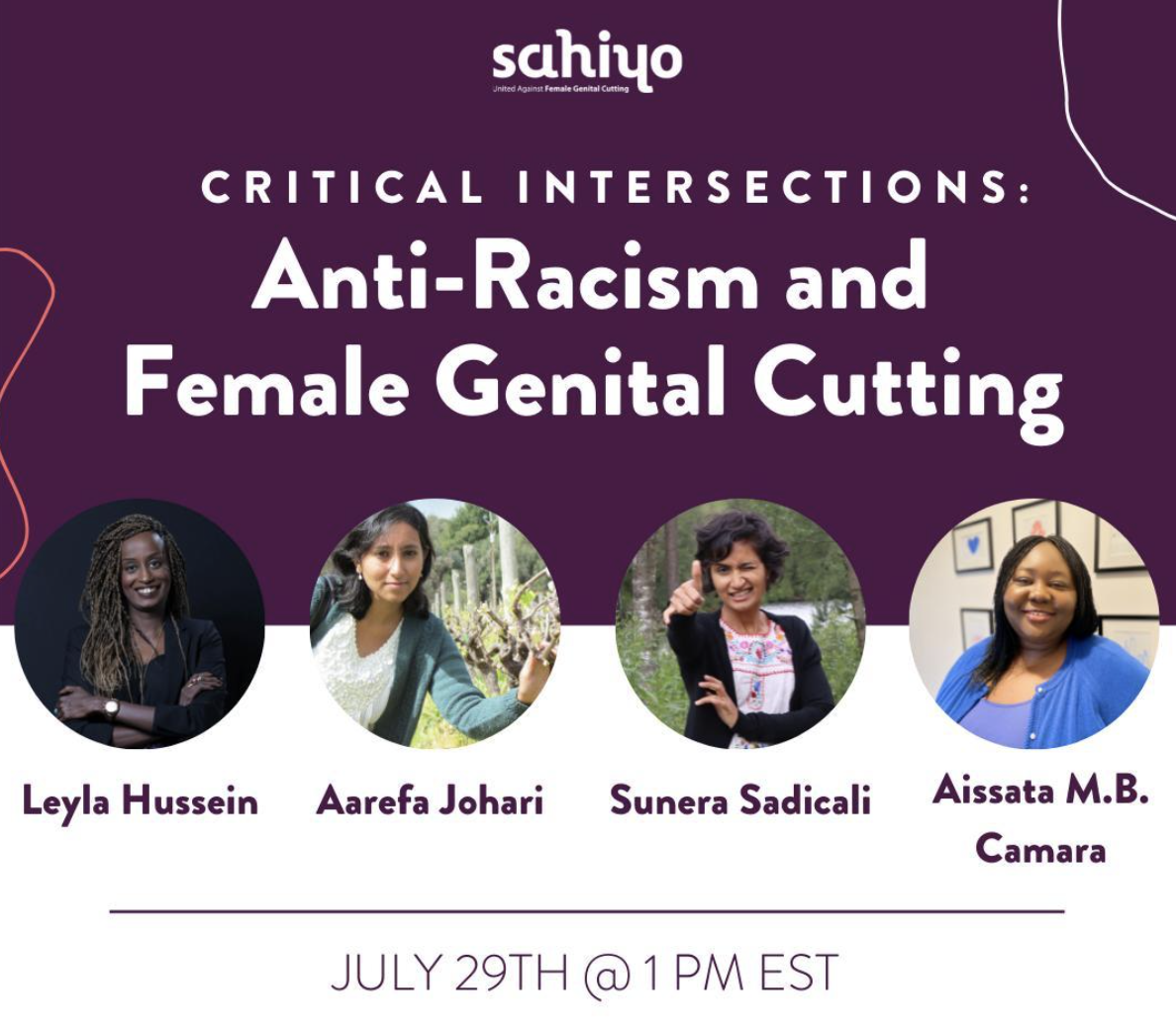Although female genital cutting (FGC) is not limited to any one community, misconceptions rooted in racism, Islamophobia, and xenophobia have still negatively impacted the movement to end FGC – as well as survivors themselves. In our work to end FGC, we must use an intersectional approach to support the needs of all women impacted by FGC and bring about substantial change. First coined in 1989 by professor Kimberlé Williams Crenshaw, the term intersectionality was created to help us understand “the interconnected nature of social categorizations such as race, class, and gender as they apply to a given individual or group, regarded as creating overlapping and interdependent systems of discrimination or disadvantage.” An intersectional approach to all social movements is crucial to address the intersecting oppressions that impact different communities.
On July 29th at 1 pm EST Sahiyo will be hosting the webinar, “Critical Intersections: Anti-Racism and Female Genital Cutting.” This webinar will explore the intersection of anti-racism work and the work to end FGC. Four expert speakers, including Leyla Hussein, Aarefa Johari, Aissata Camara, and Sunera Sadicali, will explore intersectionality and FGC in a panel moderated by Sahiyo U.S. Executive Director Mariya Taher. These renowned activists have worked in the field of FGC prevention and survivor support, exploring the critical intersections where this form of gender-based violence meets systemic racism. Our guest speakers’ experiences will expand the conversation on how FGC survivors and advocates for change often have to push back against racist narratives in their work and in their journey toward healing, as well as how systemic racism can delay substantial change on this issue.
During this webinar, you’ll be able to be a part of the discussion about how we can all become better educated and better advocates in the journey to end systemic racism and FGC. This event is open to anyone who wishes to attend. Register Today: https://bit.ly/CriticalIntersectionsWebinar

Leyla Hussein is an anti-FGM campaigner and a survivor who shares her personal experience of FGM with the goal of protecting girls from this abusive practice. Originally from Somalia, Leyla works as a psychotherapist in the United Kingdom and addresses the prevalence of FGM around the world. As Leyla reminds us, FGM is a practice of oppressing women and controlling women’s sexuality. It’s not an African issue, it’s not an Asian issue; it’s a global issue that requires a global investment in women.
Aarefa Johari is a journalist, feminist and activist based in Mumbai, India. Aarefa is a senior reporter with Scroll.in, where she covers gender and labour. She has been speaking out against female genital cutting since 2012 and is one of the five original co-founders of Sahiyo. Sahiyo is an organization founded on the belief that storytelling in all forms can create positive social change and help empower communities to abandon the practice of FGC.
Sunera Sadicali was born in 1982 in Mozambique and moved to Lisbon when she was 2 years old. She grew up in a family that was a part of the Bohra Community; they were (and still are) the only Bohras in the Portugal/Iberic Peninsula. Sunera underwent khatna (FGM Type I) by age of 8 in Pakistan while visiting her grandparents on vacation. She moved to Spain to study medicine by the age of 19 and finished her Family Medicine residency in Madrid. She has been politically active since the birth of her second child in 2012 in women’s issues, decolonial feminism, anti-racism and healthcare activism. Sunera is constantly trying to reconcile and find a balance between motherhood, art, her work as a family doctor, and political activism.
Aissata M.B. Camara is a professional with over a decade of program development and management, strategic planning, and relationship-building experience in non-profit, local government, and international affairs. A social entrepreneur and advocate, she was featured in The Guardian, PBS, RFI, Deutshe Welle and Brut for her advocacy to end female genital mutilation/cutting. She has received numerous awards, including the New York State Assembly Certificate of Merit, Knights of Pythias Medal of Achievement, the Hackett Medal for Oratory Excellence, and the Jo Ivey Boufford Award. Aissata is also a frequent speaker at conferences, including high-level events at the United Nations.
